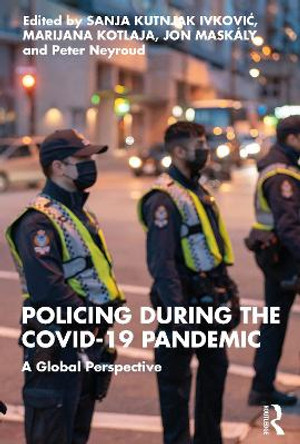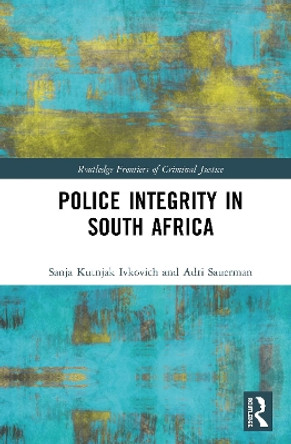Description
Policing in the 21st century is becoming increasingly complicated as economic, political, social, and legal circumstances continue to compel police organizations to evolve. To illustrate the complexity of policing in the 21st century and cover themes common to police organizations around the world, Exploring Contemporary Police Challenges: A Global Perspective is organized into six sections, which cover the key policing challenges across the globe. Based on US President Barack Obama's 2015 Task Force's organization into six broad pillars, this volume contains contributions from policing experts focusing on Building Trust and Legitimacy; Providing Policy and Oversight; Utilizing Technology and Social Media; Developing Community Policing and Crime Reduction; Providing Police Training and Education; and Facilitating Officer Wellness and Safety. Scholarly analyses and discussions of these issues in 16 countries on 6 continents offer a global perspective on policing in the 21st century. This volume simultaneously enhances the scope of policing scholarship and demonstrates that no country can sidestep the need to adjust to these rapid and profound changes.
About the Author
Sanja Kutnjak Ivkovic is Professor at the School of Criminal Justice, Michigan State University, U.S.A.
Jon Maskaly is Assistant Professor in the Department of Criminal Justice at the University of North Dakota, U.S.A.
Christopher M. Donner is Associate Professor and Graduate Program Director in the Department of Criminal Justice & Criminology at Loyola University Chicago, U.S.A.
Irena Cajner Mraovic is Associate Professor at the Faculty of Croatian Studies, University of Zagreb, Croatia.
Dilip K. Das is Editor in Chief of the series Advances in Police Theory and Practice.
Reviews
"Exploring Contemporary Policing Challenges: A Global Perspective is an edited book that includes discussions on many of the problematic areas of policing. What sets this volume apart from others is its international approach. The editors have compiled an impressive list of contributors who examine the challenges faced by police as well as their opportunities and do so from countries across the globe. The editors have put together a diverse group of readings and have divided them into sections that help the reader identify chapters of particular interest. While they are reviewed comprehensively in the introductory chapter, the individual studies, and reviews that follow produce a comprehensive and important collection that is of interest to scholars of comparative and international policing."
Professor Geoffrey P. Alpert, University of South Carolina, USA and Griffith University, Australia
"Exploring Contemporary Policing Challenges: A Global Perspective is a welcome addition to the body of knowledge dealing with global issues in policing. This book, paired with the Final Report of 21st Century Policing presents a unique and comprehensive way to view and cover the contemporary policing issues and salient solution. It's clever the way the book is in alignment with the six pillars of 21st Century policing and uses practical examples to illustrate the points. The way the book is set up is logical and easy to follow. The global perspective lends itself to exploring comparative policing challenges with salient examples from a variety of countries and policing styles. Regardless of where you are in the world, a better, more user friendly version of policing is needed in order to address police reform and the various challenges they face."
Professor Lorenzo M. Boyd, University Of New Haven
"Never before, in the modern history of police profession, there was more of a need for a book like Exploring Contemporary Police Challenges. From its focus on the most dire challenges of police profession in the 21st century, through its comparative and multinational approach to authorship based on a mix of academics and professional, this edited volume walks the reader through a myriad of complex issues that face police profession across the globe, offering not just accounts and analysis but a myriad of solutions as well. Starting with the most critical concept of how agencies need to Build Trust and Legitimacy to maintain their ability to engage in effective, consensus based policing, that can only be achieved through creation of adequate mechanisms of Policy and Oversight. The natural progression to achieve these mechanisms can be seen in the overview of Utilization of Technology and Social Media that help create the oversight through the use of body worn cameras and exposure of police community encounters through various digital platforms and on the other end, the assistance these tools provide for more effective, technology driven policing. The transition to the new modalities of Community Policing that have been heavily endorsed as the panacea for police community relations leads in the most natural manner to focus on issues related to professionalization of the members for the profession through a thorough look at the various aspects of Police Training and Education. The final part of this fine volume deals with the most critical aspect of police profession, namely the historically much ignored topic of Officer Wellness and Safety. The way this volume is structured, it affords the reader with a template of what needs to be done and in what order to change, enhance, and deliver quality policing around the world. The contribution of many of the individual authors is further amplified by their practitioner and academic background that affords them with the insider's perspective that sheds much light into the frequently criticized yet rarely thoroughly analyzed profession. Finally, the comparative aspect, with focus on countries that are rarely subject to a rigorous and empirical research directed at their police forces is a very much needed and refreshing perspective that will, finally, validate the notion that policing is a true profession that transcends countries and continents. It is a must read for students, researchers and general public who believe in the critical contribution of effective and professional policing to the creation and sustainability of democratic societies."
Professor Maria (Maki) Haberfeld, John Jay College of Criminal Justice, USA
"This edited volume represents an extraordinarily comprehensive and global perspective on policing. Organized masterfully around the pressing issues for policing in the 21st century (i.e., trust and legitimacy, policy and oversight, technology and social media, community policing and crime reduction, training and education, and officer wellness and safety), this book takes the reader on a deep dive into these challenges and areas for growth and advancement in policing. The team of editors and contributors have vast experience, expertise, and scholarship that collectively succeeds in compiling a high-level, yet accessible book that should be of interest to academics, researchers, practitioners, policy makers, and all who are interested in learning more about 21st century policing and the path forward."
Professor Wes Jennings, University of Mississippi, USA
"It is to the credit of the editors to have compiled an up-to-date collection of articles, written by a truly global and diverse line-up of competent authors, informing the readership about the most relevant "policing-problems" on the agenda of the late first quarter of the 21st century. The edition is well structured and rich on highly practical examples. From a European perspective, the read is not just worth because of the relevant share of studies covering the old continent, but also because the thinking about progress in policing and building better police institutions has long ago moved beyond national borders and traditions. Police practitioners and students with a stake in achieving high-quality policing by improved understanding of today's policing issues will take benefit of the reading."
Dr. Detlef Nogala, Research & Knowledge Management Officer, Editor of European Law Enforcement Research Bulletin, CEPOL
"This fine volume brings together fresh reports by policing experts from around the globe. The chapters speak to legitimacy, corruption, community engagement, competence, fair treatment, police violence, officer well-being, and terrorism. There are analyses of the promises and pitfalls of new technologies ranging from drones to body cameras and cybercrime. These cutting-edge reports are organized around six themes common to policing almost everywhere, and together they provide a comprehensive overview of policing in the 21st century."
Professor Wesley G. Skogan, Northwestern University, USA
Book Information
ISBN 9780367683337
Author Sanja Kutnjak Ivkovic
Format Paperback
Page Count 362
Imprint Routledge
Publisher Taylor & Francis Ltd
Weight(grams) 1100g







